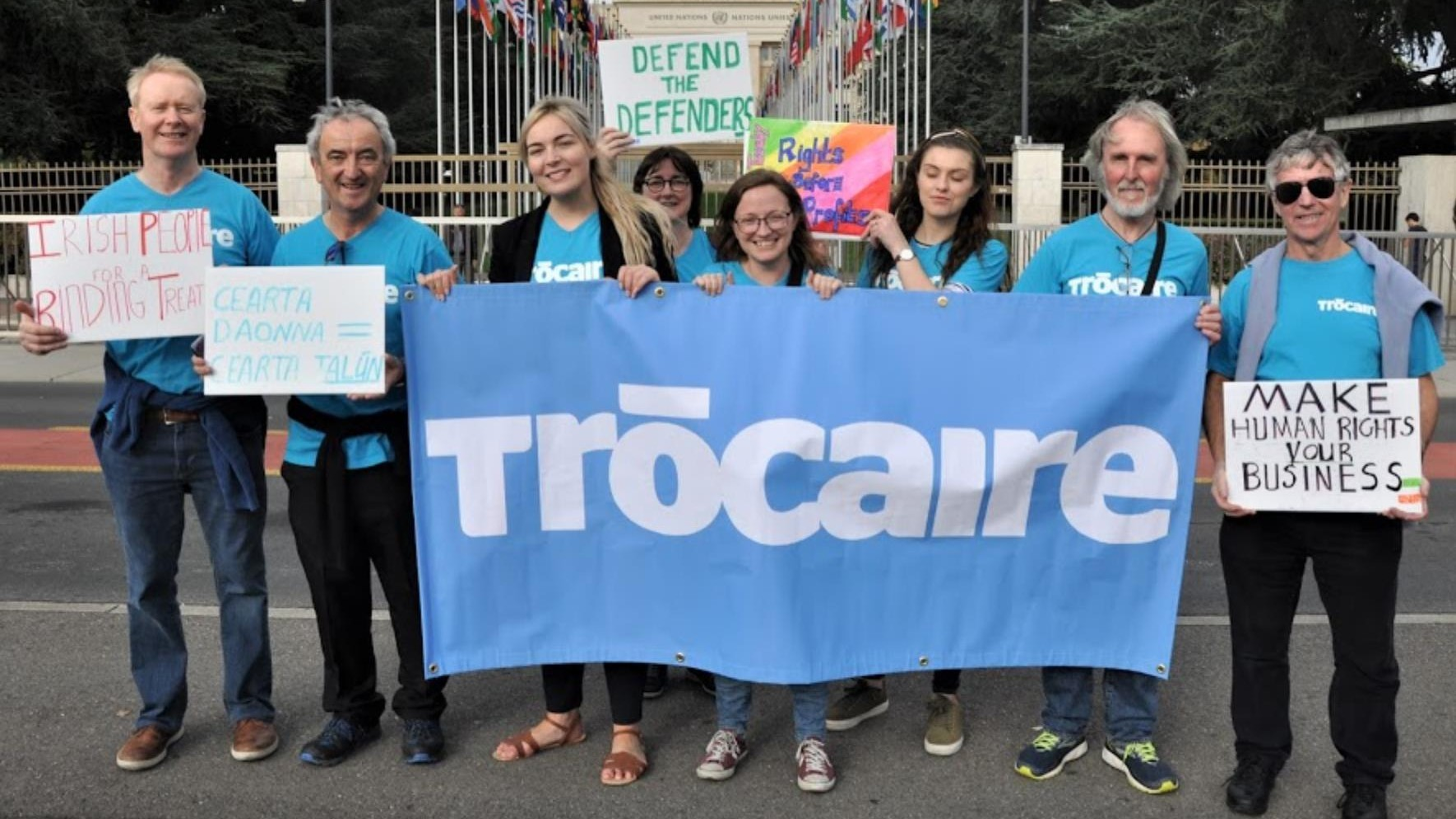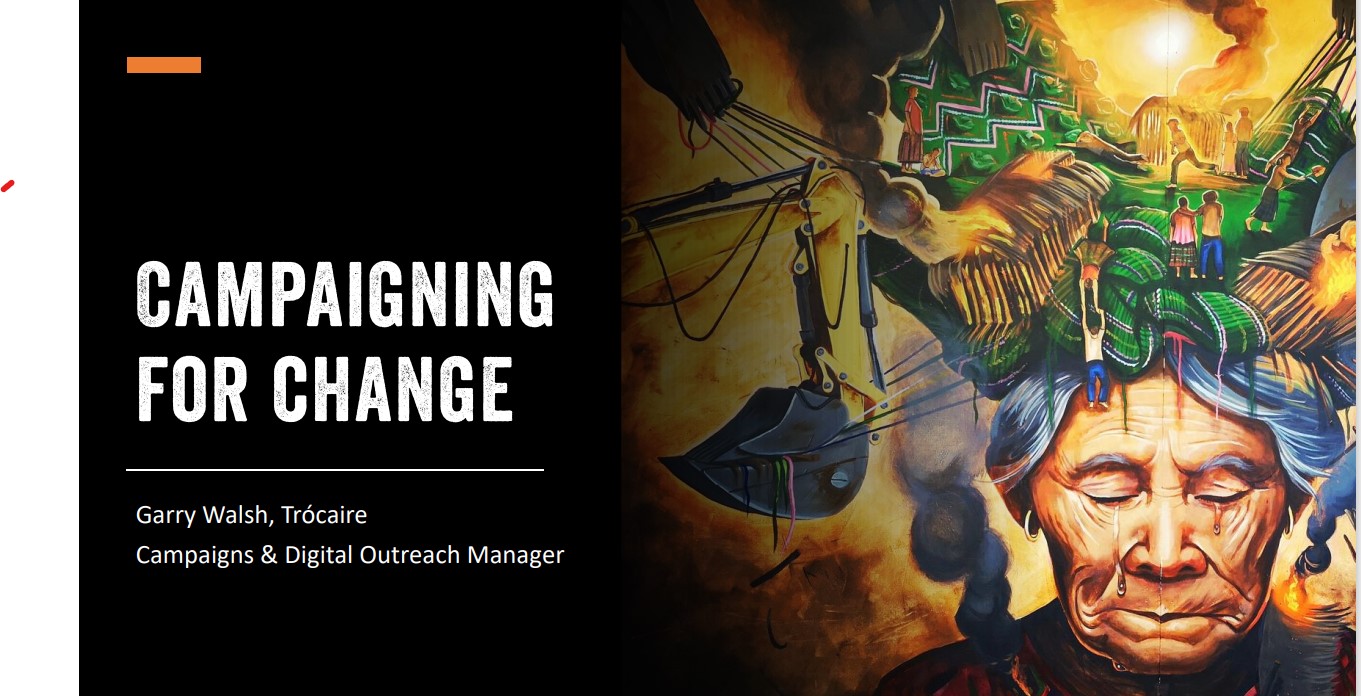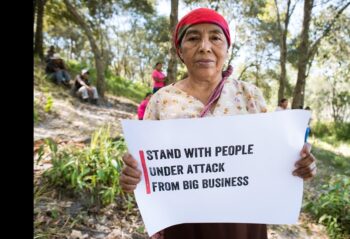
Just 100 companies have been the source of more than 70% of the world’s greenhouse gas emissions since 1988.
This is a headline fact for a campaign currently being run by the international development agency, Trócaire.
At the 2023 Praxis Summer School, we were joined on Day 3 by Garry Walsh, Trócaire’s Campaigns and Digital Outreach Manager. Garry gave an excellent presentation about this campaign in the morning, then ran a workshop in the afternoon. Garry has kindly agreed for his presentation to be published here:
Praxis – Trocaire – Part 2 – presentation – final
Note: photos on this blog are credited to Trócaire.
Trócaire have for some years now been running a campaign called:
Make it Your Business, Ireland!
Some businesses are responsible for human rights abuses and environmental damage. From violent land grabs and child labour, to the dumping of toxic waste, they are acting with impunity. At the same time, those who resist are locked up, attacked, and killed.
Fore more information on this campaign can be found on Trócaire’s website: Make it Your Business, Ireland! – Trócaire (trocaire.org)
The campaign is stating that Ireland can and must hold businesses to account.
Here is a summary from Trócaire’s website:
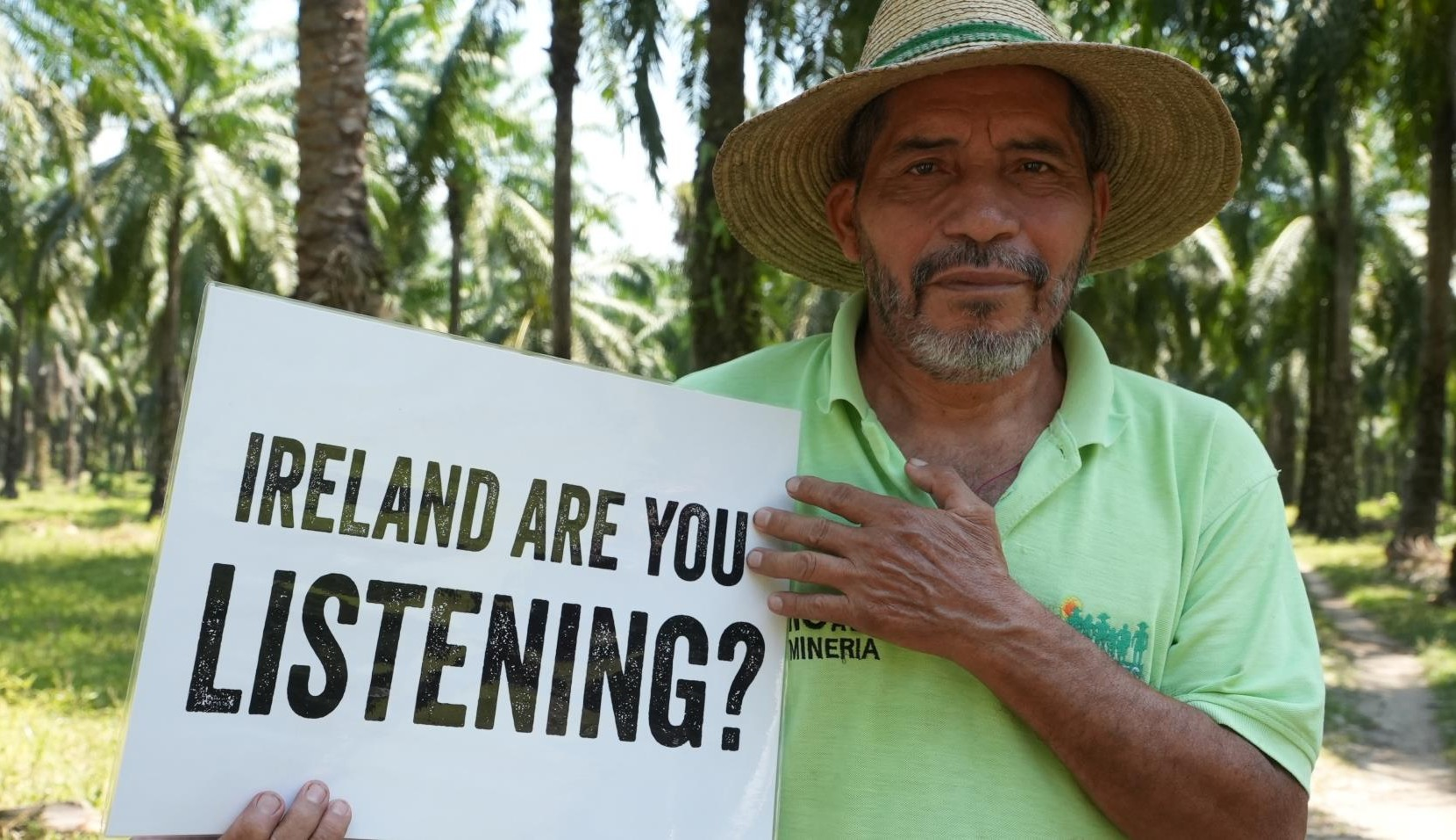
How?
Trcóaire are calling on the Irish Government to introduce corporate accountability legislation.
Legislation that would make it a legal requirement for businesses operating in Ireland, to identify and prevent human rights abuses and environmental damage occurring in their operations, anywhere in the world. This legislation would also make companies liable for any harm done to communities affected by their activities.
Many of the most high profile corporate offenders are based in the world’s largest economies. But some businesses operating in Ireland are also complicit in abuse around the globe.
You can change this.
Join our campaign calling for Irish legislation to stop corporate abuse of human rights and the environment.
We will send you information on this campaign and keep you up to date with ways to take action in support of corporate accountability legislation.
Trócaire is a member of the Irish Coalition for Business and Human Rights. For more information on the coalition, and to read case-studies of Irish companies complicit in human rights abuses, click here.


Garry Walsh is the Campaigns and Digital Outreach Manager at the international development agency, Trócaire, where he is leading on Trócaire’s policy and advocacy work on Business and Human Rights and Civil Society Space.
Participant Reflections
In the afternoon Garry ran a workshop on campaigning skills based around the Business and Human Rights Campaign outlined above. Here are some reflections from participants at the workshop.
Lorien Makhoul, Helen Treacy, Kate O Connell
CAMPAIGNING SKILLS
- What’s the theme?
In this workshop the theme was campaigning skills with a focus on politics.
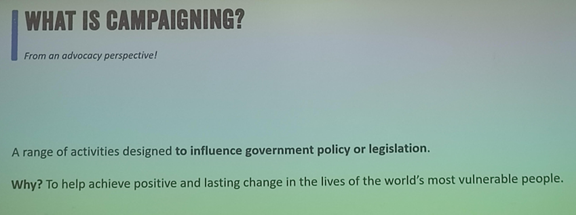
In today’s world issues around injustice, environmental change, inequality, and greenhouse gases, are becoming more prevalent. In order to demand change, campaigns are needed to influence decision making, especially in the governmental sectors.
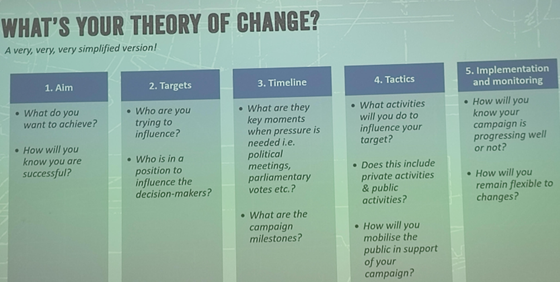
The workshop highlighted the approaches of starting a campaign (varying per chosen audience), and possible challenges aligned with these.
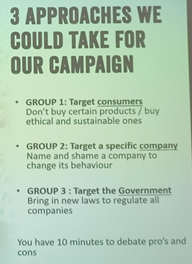
By giving us several scenarios and choosing our own campaigning strategies, we were able to apply the explained theory and discover the theme in more depth. For example, we were given two different budgets for our campaign, one was 5,000 Euro compared to 50,000 Euro. The approach of the two teams divided by their budget, was different, and so were their goals. Therefore, barriers concerning campaigns were enlightened and sometimes solved. An important theme of campaigning is collaboration, a campaign is rarely done by one individual since in masses there is power. Social media has improved the spread of information and reaches more individuals than ever before, creating a rapid platform for collaboration.
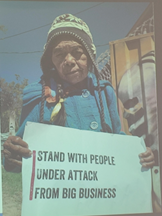
By networking and expanding your social groups, new ideas and perspectives may come alive and aid the goal for the campaign.
- Teaching methodology:
The workshop which was focused on campaigning was informative, engaging and interactive. A combination of group work along with fascinating insight from Trócaire’s leading policy and advocacy worker Garry Walsh highlighted the importance of strategic activism. Throughout the delivery of his seminar Garry stressed the importance of not becoming frustrated or feeling guilty but rather channeling these feelings into thoughtful and meaningful acts and instead getting excited.
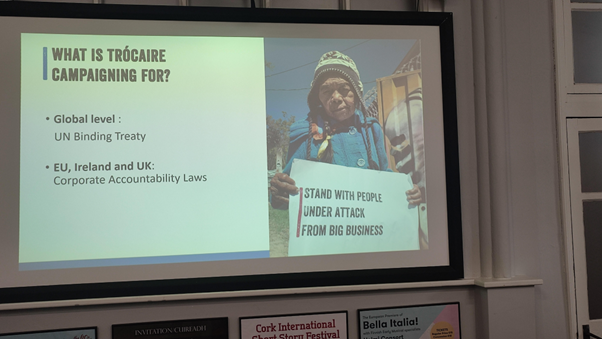
In depth discussion around a thought provoking video shown to us, which was made by Garry addressing ethical and more importantly unethical production of products, was the starting point of the seminar. In doing so, pair work facilitated the flow of solution based ideas in addition to getting an insight into our peers’ views and opinions.
Team work was also incorporated into the seminar whereby two groups had to come up with a suitable campaign in accordance with allocated funding. This task encouraged individuals to bring a range of ideas to the table to be explored and discussed based on what they believed was a cause worthy of resources. These team based activities were effective brainstorming exercises ensuring that everyone’s ideas were heard and debated.

Throughout the seminar the importance of effective campaigning was reinforced. Lobbying the government for policy changes constituted a significant part of this. This can be achieved through a number of ways but the mechanism we focused on was letter writing to those in positions of power. Individual letters were written to Minister Dara Calleary regarding the introduction of the EU’s Directive on Corporate Sustainability and Due Diligence and particularly what Ireland can do to ensure the legislation is robust.
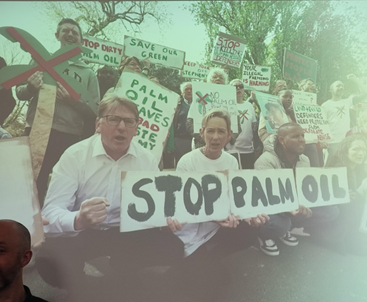
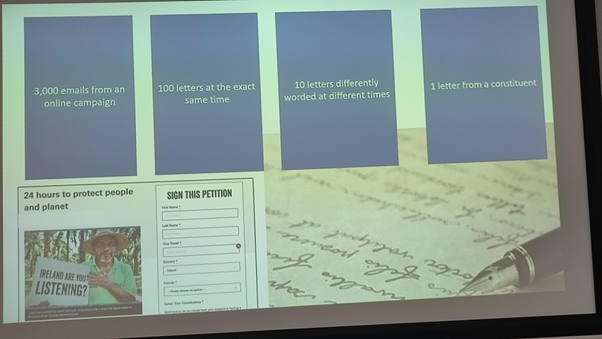
The workshop provided us with the tools to effectively convey your message, particularly when it comes to letter writing. Communication is paramount to the success of any campaign and so it is crucial that the mode of communication is well scrutinised prior to any decision making.
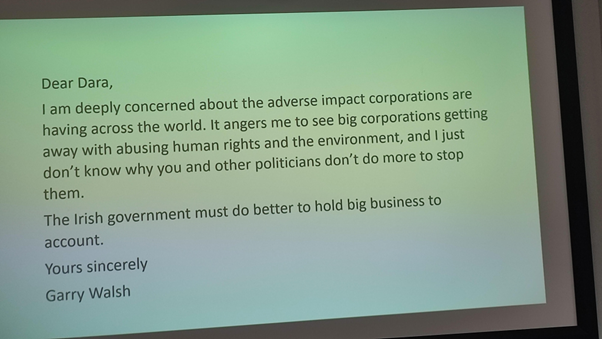
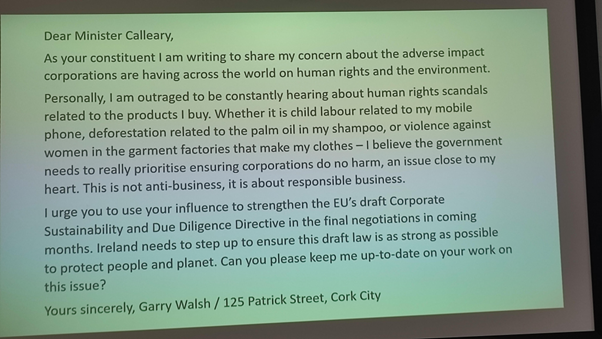
- Local/global interdependence
Mainly due to globalisation, issues worth campaigning for are often international issues. The workshop focused on the palm oil industry and how its uses vary globally; as Ireland uses it in their Panda peanut butter, and India practises it as cooking oil.

It also noted that for change to happen, a chain of reactions must take place from different countries. Instead of trying to regulate or change the law of one specific place, Trócaire aims to change European law.
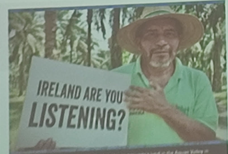
So, all countries must alter their consumer behaviour. However, these European campaigns are harder to change due to many influences from other countries, not to mention they are time consuming. Local campaigns such as the Belgian one, on the murder of Sanda Dia, are efficient in their smallness since it matters to the Belgian citizens. Due to their civil protests on the incomprehensible outcomes of the court, judges are planning on educating students on the penalties set in place regarding these crimes. Therefore, the campaign was in a way successful, regardless of it not being a global phenomenon. Another instance that does highlight the global interdependence is the Black Lives Matter movement. Sparked by the murder of George Floyd in Minneapolis, caused a global protest and strike on the unequal treatment of people of colour. In this case, due to global action a magnifier was put on (mainly) the treatment of officers on its citizens. Since the entire world was watching, action was undertaken rapidly but carefully. The workshop highlighted all of the interdependence and how these sometimes aid or trouble campaigns.
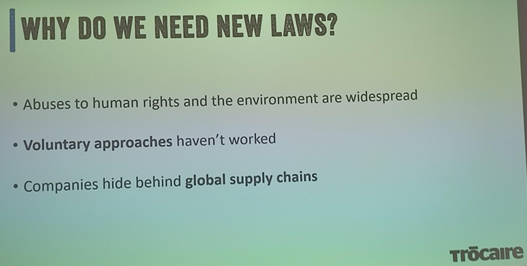
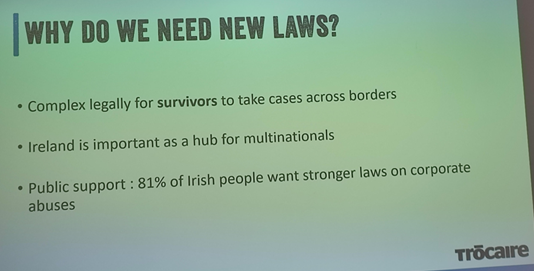
- Personal evaluation
These couple of days in summer school gave me the opportunity to critique, inquire, be informed, and educated on multiple international developments. By being surrounded by people that share these interests and knowledge, conversations came to be that were life changing and interesting. The different guest speakers varied from topics like food security to migration rights and active global citizenship. I am glad to have done these workshops since they sparked even more interest in this field of development and makes me want to continue doing the International Development course in UCC. Especially, the combination of both theoretical and practical action ensured that the information gained in the workshops would stick and could be applied in the future. Maybe, one day I may meet one of these interesting participants again and we can look back at how far we’ve grown since these workshops (Lorien Makhoul)
Personally I found the course extremely insightful and thought provoking. The way in which the course was organised, precisely the balance between interactive workshops and guest speakers was particularly good. Being surrounded by people with extensive knowledge regarding international development was both intriguing and eye opening. The variation of guest speakers allowed us to create informed perspectives on the given subject. The course was also an effective networking exercise as there was plenty of time to have worthwhile one-on-one conversations. I personally found these interactions proved extremely helpful as people were able to provide anecdotal information about their fascinating and very meaningful careers, many of which involved work in NGOs. Attending courses like this can be a daunting experience but the way in which these few days were organised and delivered ensured everyone felt welcome and comfortable voicing their opinion. Amongst all the skills and information obtained during the course, the most important takeaway, which I believe transcends all aspects of life, is to critically evaluate. Whether it is a policy or distribution of funding or simply leading news stories, it is imperative to dig deeper, asking questions and crucially look at it from all aspects, refraining from allowing one’s biases to confirm your views. I came away from this course enlightened and energised, with even more desire to become more active in both my community and on an international level.
(Kate O Connell)
I had an incredible experience learning about development and global citizenship. The three days, bringing together local and around the world outstanding, vibrant people, proved really well organised. The inspirational keynote speakers and workshops all shared their combined wealth of expertise and experience utilising global tools. This interconnected involvement has empowered me. While pursuing something I genuinely enjoy, I find that I am using my recently acquired social science understanding to explore alternative points of view, along with applying my empathy and critical thinking skills to a variety of fields. Through engaging and innovative learning, this Development Education summer school has increased my knowledge and awareness of the global community within which we live. By fostering positivity, inclusion, and action whilst confronting prejudices and biases (Trócaire, 2023). The reality is that society needs every citizen. Whether we are activists, builders, carers, disruptors, experimenters, frontline responders, guides, healers, storytellers, visionaries, or weavers, for instance, we all have individual abilities and skills that we may develop. Considering we are all equally human although diverse beings, it is crucial that we respect and understand each another’s cultures. Recognising that everyone holds different views, values, perspectives, and levels of awareness, nevertheless that connection and change may be enabled by action and lifelong learning. Global development is facilitated by the ability to share wisdom, particularly on how to address social policy issues, with an emphasis on justice. Knowing when to walk away is essential as the vision is experimental. Is there anything that humanity as a whole can achieve? Do some people have more privilege, options or barriers? In demonstrating solidarity, people recognise that discrimination impacts on everyone, and in taking responsibility, collaborating together towards developing more just and equal societies. I am more open to absorbing new concepts and sharing research. According to Ruane (2020), who highlights how diversity and equality benefits humanity hence outweigh the unjust effects of attempting to comprehend prejudice. People may have concerns with accents, colour, and various other issues, nevertheless the system has to be repaired. According to O’Connor (2023) unity entails a commitment to taking action, and confronting challenges while striving to support people who encounter injustice. Not just those who contend with this, but everyone in society is significantly impacted by prejudice and discrimination. We jeopardise losing our own humanity by depriving others of theirs. Essentially because I recognised a few individuals in an action march last Saturday, slight encouragement led to my unexpected participation in support of transgender rights. I do not fully comprehend these rights, but I was moved by learning about other people’s experiences.I am really grateful for this “Le Chéile” social movements, education and active citizenship opportunity and look forward to expanding my knowledge. I would be honoured to cross paths with the same people again, to continue these enlightening positively transformative connected conversations. Together we as academics, students, communities, and activists can collaborate jointly to reflect, take action, and make a difference to positive, beneficial and constructive change in national as well as global society (Cotter, 2023). In conclusion, I couldn’t agree more with the words of The President Michael D. Higgins (Anon., 2023) if we “stand together, to challenge all vestiges and experiences of prejudice and discrimination, to work towards a future where every person, regardless of their background or ethnicity, feels valued and respected”. He went on to say “it is by embracing the diversity that exists within our society and giving it its place that we become stronger as a nation”. I personally would add the word globally.
(Helen Treacy)
